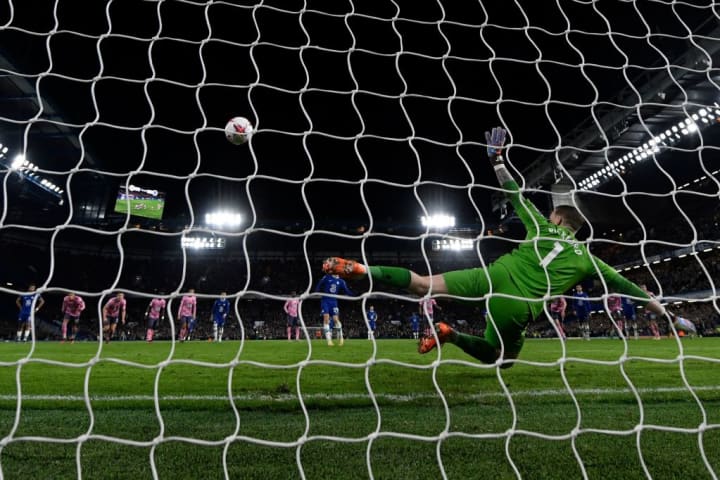
Premier League rule changes for 2023/24 season explained
The laws that govern the game of football have been argued over for centuries.
When the first unified set of rules was being thrashed out in London’s Freemasons‘ Tavern in 1863, banning the practice of ‚hacking‘ – deliberately kicking an opponent mid-dribble – caused an uproar.
A Mr Campbell from Blackheath lamented: „You will do away with the courage and pluck of the game, and I will be bound to bring over a lot of Frenchman who would beat you with a week’s practice.“
More than a century and a half later, the laws of the game are still being tweaked. With hacking long since outlawed, here are the rule changes that have been made ahead of the 2023/24 Premier League season and how they may impact players from France and everywhere else.

An initiative that was first launched by FIFA, world football’s governing body, at the men’s World Cup in winter 2022, is set to be taken up by the English FA.
Ahead of the World Cup, Pierluigi Collina – a former referee now employed by FIFA – warned: „In a match, there are on average nine minutes wasted on throw-ins. It is almost the same for goal kicks.“ The average amount of stoppage time in matches at the World Cup was a lengthy 12 minutes.
With Premier League teams like Newcastle United and Brentford gaining a reputation for tactical delays, time-wasting became an increasingly hot topic in the English top flight last season.
The list of amended rule changes provided by the Football Association only stipulated: „‚Goal celebrations‘ [are] to become a separate bullet point in the list of causes of time lost for which the referee makes allowance.“ But Sky Sports reported that one match official claimed: „It will now be a rarity if a top-flight game lasts less than 100 minutes.“

The game’s lawmakers have made another stab at streamlining the increasingly complex offside rule. The latest amendment tries to distinguish the difference between „deliberate play“ and a „deflection“.
A player in an offside position is deemed to have gained an advantage – and thereby broken the rules – when they become active once the ball has „rebounded or been deflected off the goalpost, crossbar, match official or an opponent“. If the offside player is „receiving the ball from an opponent who deliberately plays the ball“, then they have not gained an advantage and so the flag stays down.
The problem with this law is what constitutes „deliberate play“ and a „deflection“.
As of 2023/24, „deliberate play“ is when „a player has control of the ball with the possibility of passing the ball to a team-mate; or gaining possession of the ball; or clearing the ball (e.g. by kicking or heading it)“. It does not matter if the action was successful as long as it was deliberate.
READ THE LATEST PREMIER LEAGUE NEWS, RUMOURS & GOSSIP

Any fans of Bruce Grobbelaar or Jerzy Dudek’s distraction tactics will be dismayed by the latest update regarding a goalkeeper’s influence over a penalty taker.
According to the reworded Law 14, „the goalkeeper must not behave in a manner that fails to show respect for the game and the opponent, i.e. by unfairly distracting the kicker“.
The rule had previously prohibited a keeper from „touching the goalposts, crossbar or goal net until the ball has been kicked“. But by making the phrasing more vague, the referee can clamp down on any conduct that they deem to be unsporting.

The Premier League’s new participant and fan behaviour charter was ushered in on the eve of the 2023/24 season after referees‘ chief Howard Webb lamented the „decline“ in behaviour towards officials.
Webb explained: „We have too often confused unacceptable behaviour as passion. We’ve turned a blind eye or a deaf ear.“
Many of the entirely new rules for the coming season have been drawn up to combat this issue which, according to Webb, has spawned „copycat behaviour at grassroots levels and that’s resulted in people either quitting as referees or not choosing to take up the whistle“.
Under the new measures, just two people are allowed to be on their feet in the technical area at any one time but „only one person can stand at the front of the technical area and coach during the match“. Newcastle’s assistant manager Jason Tindall has attracted ire from opposition coaches (and fans) in the past for his front-foot approach alongside Eddie Howe.
Those seated are not allowed to challenge a referee’s decision with technology – although, VAR officials are still encouraged to – and no member of staff is permitted to enter the pitch at any time before, during or after the match.
Persistent infringements will result in increasing fines.
#UPDATE | A man has been charged after being arrested during the FA Cup final at @wembleystadium.
He was arrested after being seen wearing a shirt which appeared to refer in offensive terms to those who died in the Hillsborough tragedy.
Read more 👇https://t.co/SMPNqNEU1w
— Metropolitan Police Events (@MetPoliceEvents) June 4, 2023
A particularly depressing motif of the 2022/23 campaign was the rise in ‚tragedy chants‘; vile songs and slurs that mock past disasters among rival fanbases.
Ahead of Manchester United’s Premier League meeting with Liverpool last March, Erik ten Hag and Jurgen Klopp released a joint statement pleading with fans to avoid chanting about the Munich air disaster, the tragedy at Hillsborough or any other catastrophic loss of life. „There are lines that should not be crossed,“ the statement read.
The Premier League have elicited the expertise of the UK’s Crown Prosecution Services to specifically address the issue of tragedy chanting. The league’s governing body came to the conclusion that stadium bans and criminal prosecutions would be enforced depending on the severity of the tragedy abuse offence.